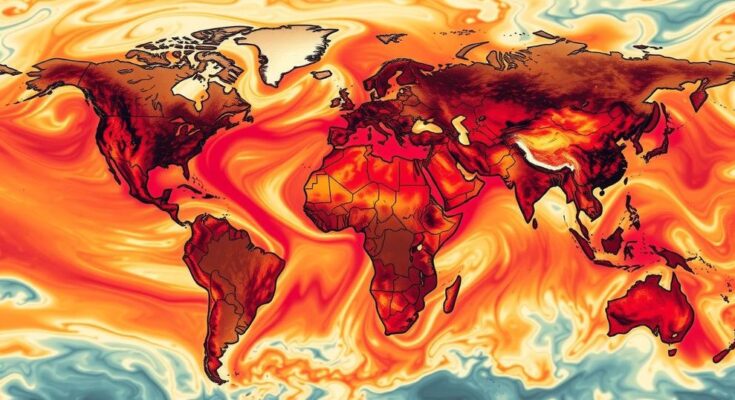In 2024, individuals suffered an average of 41 additional days of dangerous heat due to climate change, marking the year as potentially the hottest on record. Extreme weather events linked to climate change, such as heatwaves and storms, have had devastating impacts worldwide, particularly affecting vulnerable populations. Researchers find critical connections between these phenomena and human activity, emphasizing the urgent need for cohesive climate action.
In 2024, individuals worldwide experienced an average increase of 41 days of dangerous heat attributed to climate change, as reported by researchers from World Weather Attribution and Climate Central. This alarming statistic highlighted the ongoing trend of escalating extreme weather and heat events, marking 2024 as potentially the hottest year on record with significant adverse effects on global populations. According to Friederike Otto, the lead scientist at World Weather Attribution, climate change significantly intensified various weather phenomena, resulting in heat, drought, and severe storms that devastated communities and livelihoods across the globe.
Major heatwaves affected regions including Northern California, Mexico, Central America, and Southern Europe. Vulnerable populations, particularly in West Africa, were among the hardest hit, prompting school closures and other emergency measures due to the extreme heat. These intense conditions were examined through global temperature comparisons, suggesting that certain regions experienced over 150 days of extreme heat connected to climate change. Kristina Dahl of Climate Central noted that the most severely affected areas are often among the world’s poorest nations.
The analysis of 29 extreme weather events, which collectively resulted in over 3,700 fatalities and significant displacement, revealed clear links to climate change in 26 of those incidents. The research indicates that while the El Niño phenomenon contributed to some extent, human-induced climate change was the more significant driver of the extreme weather observed in 2024. Scientists warned that the planet is nearing the 1.5 degrees Celsius limit outlined in the Paris Agreement, with potential irreversible impacts looming if carbon emissions continue unchecked.
Experts agree that proactive measures can mitigate the effects of climate change. Julie Arrighi from the Red Cross Red Crescent Climate Centre emphasized the importance of countries adapting to and preparing for climate extremes, noting that collective action is imperative in addressing these challenges. The United Nations Environment Programme reaffirmed the urgency of taking substantive steps to lower greenhouse gas emissions to avert further climate crises.
The article discusses the alarming consequences of climate change in 2024, specifically highlighting a significant rise in dangerous heat days across the globe. It references a comprehensive analysis conducted by scientists, which identifies direct correlations between human-induced climate changes and the escalation in extreme weather conditions. As climate records were broken throughout the year, the report underscores the pressing nature of the climate crisis and the urgent need for comprehensive action to combat its effects. The inclusion of expert opinions enhances the understanding of these complex issues and emphasizes the necessity for collective international efforts to combat climate change.
The findings from 2024 underscore the critical impact of climate change, as evidenced by the average of 41 extra days of dangerous heat experienced globally. The disproportionate effects on vulnerable populations serve as a stark reminder of the urgent need for climate action. With significant links established between extreme weather events and climate change, the call for global cooperation and adaptation strategies is more pressing than ever. Continued reliance on fossil fuels poses a grave threat to global stability and necessitates immediate and collaborative international responses to mitigate these dire outcomes.
Original Source: www.theweek.in




